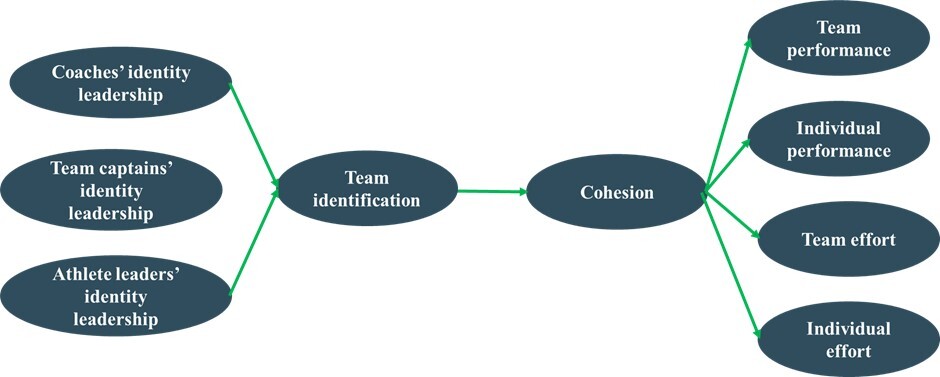What did we find?
1. Is identity leadership effective in both WEIRD and non-WEIRD countries?
The answer to this question is YES. Identity leadership is key to promoting athlete mental health (i.e., increasing well-being and reducing burnout) and team effectiveness (i.e., increasing performance and effort) across most WEIRD and non-WEIRD countries.
2. What factors contribute to the effectiveness of identity leadership?
Here, we found evidence for two pathways. The first, a mental health pathway, demonstrates how various leaders influence athletes' mental health. The second, a performance pathway, illustrates how different leaders enhance both individual and team performance.
A. Mental Health Pathway
Identity leaders play a crucial role in boosting athlete mental health by fostering a strong sense of ‘we-ness’ or ‘us-ness’—essentially, a strong team identity. When athletes share a common identity with their team, it makes them feel supported by their teammates. In a nutshell, identity leaders are effective because they build a strong team identity which makes athletes feel supported, and ultimately contributes to better mental health.

B. Performance Pathway
Identity leaders are able to promote team effectiveness because they make team members feel like they are part of a common ‘we’ or ‘us’. In other words, identity leaders build team identification amongst their team members. This team identification makes the team more cohesive, which in turn contributes to team effectiveness, characterized by improved effort and performance on individual and team level.

3. Does a country’s culture influence how effective identity leadership is?
Culture influences the effectiveness of identity leadership to a relatively limited extent. More specifically,
- Identity leadership is equally beneficial in promoting athlete mental health in countries high and low on collectivism.
- Identity leadership on the part of coaches and team captains is effective at promoting team effectiveness in countries high and low on collectivism, but their leadership is even more effective in countries high on collectivism. The leadership provided by the best athlete leaders within the team is equally beneficial across countries high and low on collectivism.
Conclusion: Overall, identity leadership is beneficial across cultures.
4. Whose identity leadership is most important in promoting athlete mental health and team effectiveness? Is it the coach, the team captain, or the best athlete leaders within a team?
We found that identity leadership from both coaches and the best athlete leaders within a team is crucial for promoting athlete mental health and team effectiveness. The leadership provided by the team captain, on the other hand, is relatively less important. This means that coaches should invest in developing the leadership of team members in order to unlock the team’s full potential.
